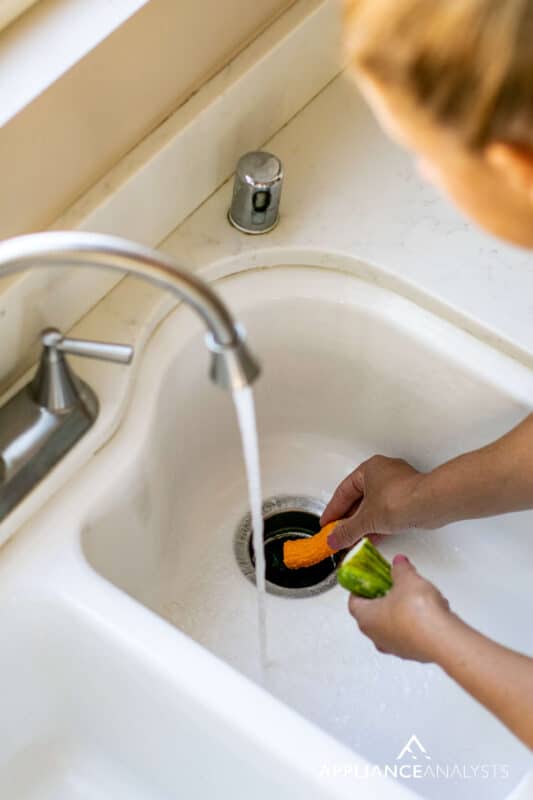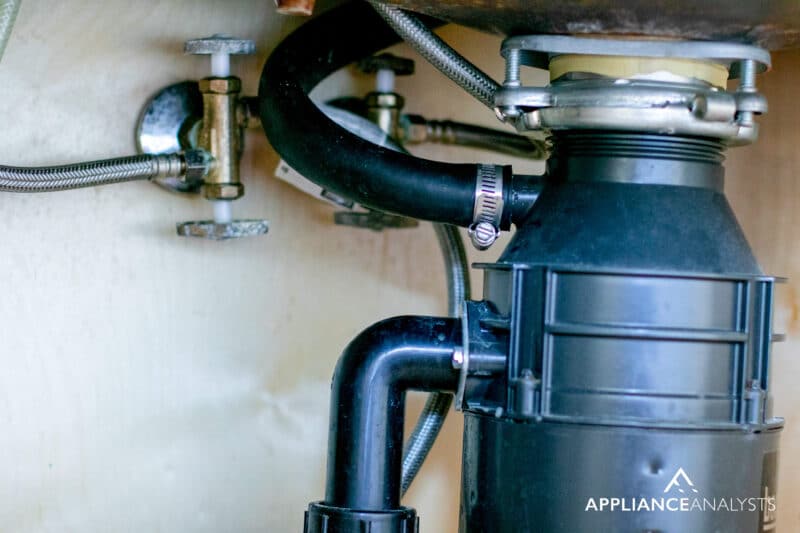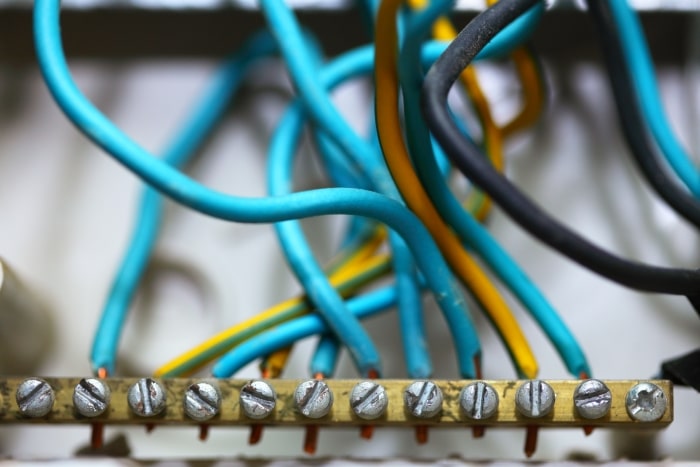We've independently reviewed this article to make sure it's as accurate as we can make it.
To find out more about our article creation and review process, check out our editorial guidelines.
Is your garbage disposal tripping your breaker, and it’s got you really confused?
You’re not alone! I know how annoying it can be when your garbage disposal stops working.
But don’t worry; I’m here to help. Below, I’ve prepared a small list including common causes behind the problem and some simple solutions you can try.
If your garbage disposal keeps tripping your breaker, try changing the food you’re throwing into it, testing the plug socket, and checking the motor. It’s also important to inspect the wiring.
Read on to stop your garbage disposal from tripping the circuit breaker!
Why trust us? This article was written by Craig Anderson and James Blackford.
Craig has helped thousands of other homeowners repair their appliances since 2016.
James is one of our resident appliance experts with over 16 years of experience. He currently works as a Master Technician for SquareTrade, and runs his own appliance repair business.
Garbage Disposal Tripping Your Breaker? Try These 4 Fixes
From what I’ve seen, garbage disposals can trip a circuit breaker due to numerous reasons. Luckily, there are different simple solutions you can try.
Before we get started, one quick tip to try is looking to see if the garbage disposal has a red reset button. Some models do have this button, and holding it down for a few seconds could help clear a malfunction.
#1 Change the Food You’re Shredding
When I see a garbage disposal that keeps tripping the circuit breaker, I always ask homeowners what type of food they shred.
I know that common sense dictates that a large appliance with sharp blades and a powerful motor should be able to shred any food. But sadly, this is not the case.
In fact, stringy vegetables and pasta could get stuck on the garbage disposal’s blades and cause excessive strain on the motor, resulting in a tripped breaker.

Solution: Take a closer look at what you throw into your kitchen sink. There are some foods that should never go into your garbage disposal, especially hard foods that can cause it to bang or vibrate, so avoiding them can extend your appliance’s lifespan.
Additionally, disposing of the wrong foods can also contribute to a sewage smell coming from the sink, as residue can get stuck and rot after a while.
#2 Check the Socket
If your garbage disposal is tripping the breaker, I recommend checking the plug socket it’s connected to.
Try connecting a different appliance to the same socket for a few days and see if the breaker trips.
If the circuit breaker does trip, it indicates a problem in the wall wiring rather than the garbage disposal. In such cases, it’s best to call an electrician.
However, if the breaker remains unaffected, the issue is likely related to the garbage disposal’s motor. Please keep reading to learn how to fix it.
#3 Replace the Motor
In my experience, a faulty motor can be the culprit behind a garbage disposal tripping the circuit breaker.
When the blades become hard to turn, it indicates the motor is working extra hard, pulling more amps of electricity and potentially tripping the breaker.
Garbage disposal motors and blades are made to last, especially if you buy a model from a reputable brand. However, while the materials are sturdy, they’re certainly not indestructible and will wear out eventually.
In such cases, you’ll need to replace your garbage disposal. Here’s how to do it:
- Make sure the garbage disposal switch is turned off to prevent accidents. If possible, kill the power to your kitchen directly from your breaker.
- Disconnect the drain pipe and drain hose.
- Rotate the collar connecting the garbage disposal to your sink in a counterclockwise motion. This should loosen the unit enough to carefully remove it.
- After removing the old unit, look at the bottom part of it. You’ll see a small access panel held in place by some screws.
- Remove it to expose the power cord cables that supply electricity.
- You should typically see three wires, one that’s black, one that’s white, and one that’s green (ground). They should all be connected to other wires within the appliance. I suggest using a marker to know which cable goes with the black wire and which one goes with the white one.
- Carefully disconnect all wires and remove the power cord from the old unit when you’re done (if there’s a cable clamp holding it in place, you can usually remove it with a pair of pliers).
- Insert the power cord and the cables through the clamp in the new unit, connect the black, white, and green wires where they belong, and then clamp the power cord back down.
- Once you’ve taken care of the wiring, you can now install the new garbage disposal unit. Reconnect it to your sink with the collar, and reconnect the pipes.
- Test to see whether the garbage disposal works normally. If it doesn’t trip your breakers anymore, you’re good to go.
If you want to get any replacement part – or see how much one would cost – click to enter your model number in the search bar below. Our partners at AppliancePartsPros stock almost every part with free guides on how to install them.

I know trying to replace your garbage disposal for the first time can be intimidating, but it’s much simpler than you think. That being said, if you don’t feel confident enough to install a new garbage disposal on your own yet, there’s no shame in calling a professional plumber for help.

You can still learn by watching them work so you can take care of everything the next time.
#4 Inspect the Wiring
If your garbage disposal trips the breaker as soon as you turn it on or even when you’re not using it, there could be a wiring issue.
Try unplugging the garbage disposal and inspecting the wires for any visible signs of damage. If they look burnt, they’ll need to be replaced. In such cases, it’s best to consult the manufacturer’s manual or call an electrician.
It’s worth mentioning that there’s a chance that the reason your garbage disposal is tripping your breakers is a problem with your home’s wiring.

Houses have to be built under strict codes and regulations that not only encompass piping and structural materials but also electrical wiring to prevent fires and issues like the one you’re experiencing.
And while I’m not saying your residence was built improperly, there’s always the possibility that certain external factors are responsible for damage to your electrical layout over the years.
Solution: In cases like these, you’ll want to call a professional electrician and explain the issue to them. It’s of the utmost importance that you mention that you have already replaced the garbage disposal so that they can rule the appliance out as a potential culprit.
Now, I won’t lie. Having an expert diagnose and repair anything that might be wrong with your home’s wiring will likely be expensive. But at the end of the day, it’ll be worth it.
Stop Your Garbage Disposal From Tripping the Breaker
Hopefully, now you know how to fix a garbage disposal that keeps tripping the breaker.
Remember, avoid throwing stringy foods down the sink, check the plug socket, inspect the wiring, and replace the garbage disposal if necessary.
Thank you very much for sticking with me all the way to the end. If this article proved to be interesting and helpful, please check out our other wonderful resources below to keep the learning going.
Have a great week!









